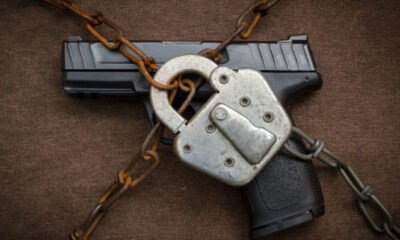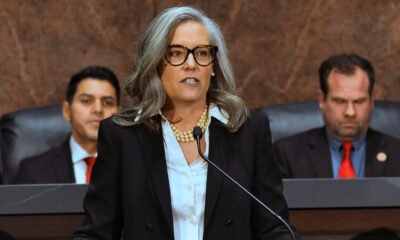doug ducey
Court Shields Identities of Election Workers Amid Rising Concerns

Members of the public are not entitled to know the names of election workers who review the signatures on ballot envelopes, a judge ruled on Thursday.
We The People, an organization aligned with Kari Lake, had sought this information from Maricopa County since January 2020. The group aimed to investigate the speed at which some signatures were verified.
In a five-page ruling, Maricopa County Superior Court Judge Scott Blaney stated that such information is generally considered a public record. However, he noted that this presumption can be overridden if there is a legitimate public interest.
Blaney cited credible evidence of threats and harassment against election workers, deeming these concerns paramount to the public’s right to know.
Much of the request stems from Lake’s attempts to overturn her 2022 election loss to Katie Hobbs. One of her witnesses claimed that about 274,000 signatures on early ballots were verified within three seconds, with around 70,000 taking less than two seconds. Courts have dismissed all of Lake’s challenges, ruling that the evidence was legally irrelevant.
In its action filed in April 2023, We The People submitted evidence suggesting that some signature verifiers worked remotely. They argued that the rapid pace and the improbability of a 100% validation rate warranted further scrutiny.
The group contended that obtaining the names would facilitate interviews to understand the workers’ training and procedures.
Maricopa County Recorder Stephen Richer agreed to provide the names of managers but refused to identify lower-level employees, citing concerns over potential harassment and threats.
“The public has a right to inspect public records,” Blaney wrote, adding that any rejection of such a request must show specifically how it would violate privacy or state interests.
According to Blaney, there was “credible, uncontested, sworn testimony” from Richer and Kristi Passarelli, former assistant director, regarding threats they received. The judge also noted that three individuals had been charged by the U.S. Department of Justice for making threats to Richer, with one already pleading guilty.
Blaney pointed to additional security measures, including a black fence, surveillance drones, rooftop snipers, more security guards, and bullet-proof glass, as evidence of the severity of these threats.
“It is not reasonable to assume that the Recorder’s Office would take such extreme measures if the threats had not been as frequent, intense, and alarming as alleged,” Blaney wrote.
The judge also mentioned concerns over the chilling effect these threats could have on recruitment and retention of essential temporary workers.
“These concerns outweigh the public’s right to know the identities of these lower-level, non-managerial employees,” Blaney concluded.
Richer had offered to provide unique identification numbers for each worker, allowing for data tracking without exposing individual identities, although this wouldn’t facilitate the interviews sought by We The People.
A message to We The People was not immediately returned.
In a related development, Richer lost his bid for reelection in the Republican primary to Rep. Justin Heap, who will now face Democrat Tim Stringham in November.




![Photos of new Maricopa judges pro tempore Richard Platt, Angel Raymond and Kevin White over an interior image of the Maricopa Municipal Court. [Jeff Chew, submitted]](https://arizonanews.org/wp-content/uploads/2025/02/City-Welcomes-Trio-of-Temporary-Judges-to-Municipal-Court-400x240.jpg)
![Photos of new Maricopa judges pro tempore Richard Platt, Angel Raymond and Kevin White over an interior image of the Maricopa Municipal Court. [Jeff Chew, submitted]](https://arizonanews.org/wp-content/uploads/2025/02/City-Welcomes-Trio-of-Temporary-Judges-to-Municipal-Court-80x80.jpg)












